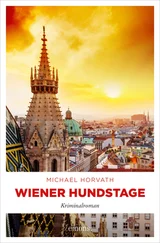A pause, maybe for effect, then the voice Schöner knows so well, strange through the microphone. Schöner closes his eyes, and as he does, he can almost imagine they are ambling through the woods. Branches dip down upon his retina, so real-looking that he feels an involuntary urge to duck. He forces his eyes open. The words sound familiar, too, ordered just slightly differently from many of their conversations. He half-expects Heidegger’s xeric laugh, which barely leaves his jaw, and he begins to drift into the usual reverie. But he’s jarred awake. Phrases like “German destiny” and “the historical spiritual mission of the German people.” He hears “‘Knowing, however, is far weaker than necessity.’” Again and again — it is unmistakable. “German.” “Destiny.” “Historical mission.” “Spiritual.” “German.” “German.” The new rector repeats them like mantras. Wide awake now, Schöner shivers at the thunderous applause that greets each one. He looks around, expecting monsters, and sees worse: aught but the ruddy enthusiasm of a pep rally. Then he hears something about a proposal for labor service. Worse, military service. What is this doing in his speech? “Teachers. . students. . primary responsibility to the state.” “The will of the people. . asserted itself.” “This. . destiny.” Where is the assertion of the university that was promised? Where is Heidegger? Schöner turns to Kindler, who will not return his gaze. Finally, with the flourish Schöner imagines he must bring to his great lectures, Heidegger quotes Plato: “‘All that is great stands in the storm.’” And he is done.
More applause erupts. For some reason, he thinks suddenly of Max, the one who slipped out of Heidegger’s lectures early, years ago.

His final conversation with Heidegger is a blur to him now — how much more clearly he recalls the aftermath, the implication that he is on the short list of those to be considered for termination. Only because his discipline is out of alignment with the immediate goals and needs of the National movement. Heidegger never utters the words “It’s not because you are a Jew,” but the two men know each other well enough to understand that whether true or not, this is the unsaid thing. There is a certain coldness in Heidegger’s demeanor, as though by granting Schöner the ten minutes he did, he was shortchanging someone else.
But even the months afterward, before he can secure a visa to look elsewhere for teaching positions, are hazy. There are conversations with Kindler and others about options. It is still early enough to get out of the country without too much hassle if you have been dismissed from a first-rate teaching job. No one, Heidegger least of all, wants to invoke the outrage of the international scholarly community. Given the events to follow, this will soon seem like a laughable reason to have granted him a visa, but there you have it.
There are conversations with his parents, who urge him to go. He will send for them once he is established somewhere, they decide.
There are conversations with other scientists who have been cut or who know they are next to feel the ax’s swing, whether because Jewish or labeled pacifists or Communists or simply strapped with the designation “un-German.” The consensus, particularly of the physicists, is that America is where they’ll be most welcome, where they can wait out this passing era and keep pace with the relentless curve of scientific knowledge until they can return to German institutions.
Years later, when it has become apparent how narrow the window he’s slipped through is, that already two concentration camps for those deemed political enemies are operating in Baden, where Freiburg is located, he conjures a fantasy. That fantasy looks something like this: He, Schöner, Schimmler, shimmying his way up a tree and slipping effortlessly from branch to branch in the uppermost canopy, right across the border into France or Switzerland.
Even the first years in America, when he has to reckon with the fact that his lack of English means he is essentially denuded of academic laurels and qualifications, unlike the physicists, who speak a subatomic language that transcends words and who are, in fact, being courted by the American government — even these are somewhat hazy now. Like most German refugees of the time, he goes first to New York, to Washington Heights and Inwood, where other German Jews have established a veritable diaspora. Unlike most, though, he feels almost immediately confined by the city, a rat familiarizing itself with its cage. He has no Berlin in his past to become sentimental about, and while Fort Tryon and Inwood Park offer him enclaves of lushness, the city’s traffic and smells and grime threaten to smother him. For the moment, he is reborn under the sign of the ailanthus, the plant that manages to grow out of cracks in the pavement in the unlikeliest places. This sustains him long enough for it to dawn on him that he can offer himself up for a pittance as a landscaper for a family of wealthy German New Yorkers, whose handsome brownstone holds a courtyard that quickly becomes putty in his hands, transformed into a veritable slice of the Homeland. A family with whom he can communicate. With a daughter self-assured enough to choose love over social status, and who loves the sounds of the Latin names of trees and the German ones as they waltz together up the path that rims the edge of the Hudson. A family that purchases a piece of land for a summer home in Peterborough, New Hampshire, a place so far away from New York and so distinct, it seems like yet a third country.
He likes to tell Sabine and others that he won it in a poker game in a musty bar in southern New Hampshire, but those who know him catch the coruscation in the eye of the teller.

He immediately falls in love with the plot just behind the house; the resemblance to the Black Forest is downright uncanny. Slowly, he begins to learn English so that he can fit in with these suspicious New Englanders. Three times over, he is an outsider here — as German, as Jew, and as transplanted New Yorker, though given his experience in the city, he can only laugh at this last. Over the next couple of years, he and Sara make the New Hampshire home their permanent residence. He jokes that all he wants is to learn enough English to turn up his nose at someone greener than he in town. The real underlying motivation, though, is so he can read the presettlement charters kept down at the archive in the town hall, and learn the history of the land on which they live. It’s a beautiful tract, teeming with red oak and red maple, or Quercus rubra and Acer rubrum, names like those of old friends. There are also paper birch, yellow birch, and sweet birch on the plot, not to mention a handful of glorious white pines the likes of which New England is famous for. He practically expects to see the king’s demarcation on these last, for which, of course, he’d have to, at least mentally, reprimand the king. He’s fascinated by the impact humans have had here, the preponderance of stone walls in the south on pastured land, the massive logging of the White Mountains.
Nineteen thirty-eight is a lean year for a landscaper, as Americans eye Europe warily, and guard their own pockets accordingly. While he dreams of returning to Freiburg, the extended silences of his parents, other family, friends, and former students make Germany seem more and more distant and forbidding.
Then, on a September evening, the most powerful hurricane of the century rips through Peterborough almost completely unexpectedly. They have at most a couple of hours of warning. Florida gears up for the storm, and then it is mistakenly thought to have gone out to sea. The Weather Bureau calls for a “chance of rain.” By evening, Providence sits under fourteen feet of water and the streetcars have shorted out, setting off a ceaseless cacophony of horns. Schöner is landscaping a house in north-central Massachusetts, and Sara manages to get in touch with him. He tries to race home, but the storm soon overtakes him, and he takes sanctuary in a mill in southern New Hampshire. It takes him two days to get home — roads are flooded, bridges out, the rivers that passed underneath having permanently changed course. Sara, having waited out the storm in the attic, is unharmed, but the house is flooded. By the time he arrives in downtown Peterborough, he’s seen a lot of damage, but the sight of the steepleless church makes him stop short just where the traffic light used to hang.
Читать дальше













